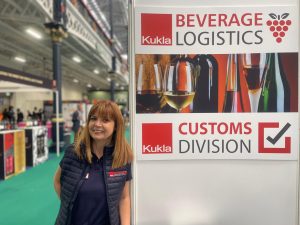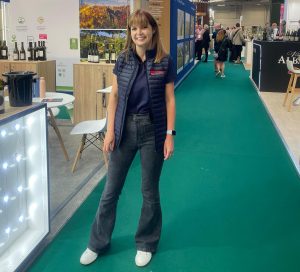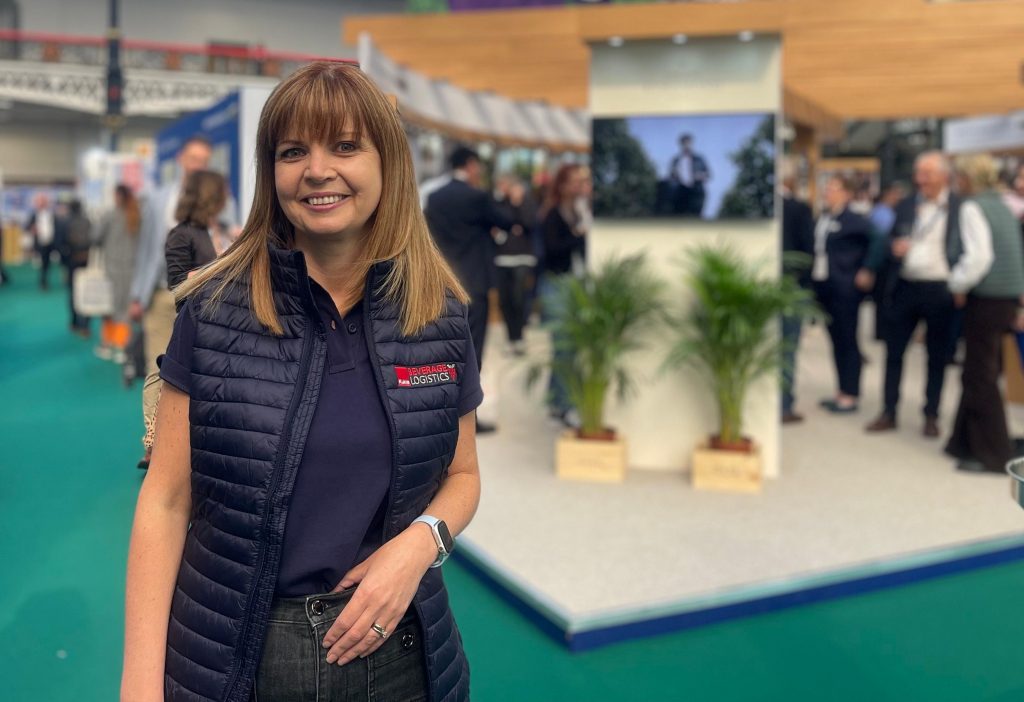In the advancing landscape of logistics, every day brings new challenges and opportunities. Lynda Simms, Commercial Director at Kukla, exemplifies leadership that balances strategic vision with hands-on dedication. From the moment she starts her day focusing on real-time industry needs to mentoring the next generation of logistics professionals when needed, Lynda’s approach is rooted in people, trust and innovation. She shares insights on what sets Kukla UK apart in the competitive drinks logistics sector, the role of technology and sustainability in shaping their future and her candid advice for women breaking barriers in a traditionally male-dominated industries. Lynda’s story is one of passion for her team, her clients and the work-life balance that fuels her success.
What are the first things you look for at the beginning of your working day?
It always starts with a cup of tea — that’s non-negotiable. Then I like to take a moment to get a feel for the day ahead: any updates from our overseas partners, anything happening in the drinks trade, and how accounts and sales activity are tracking. I’m not hands-on with day-to-day operations, but I like to know where support might be needed. It’s about setting a positive tone for myself and the team before things start moving at full speed.
Since starting Kukla UK in 2017 with Steve Wood (MD) and Martin Jacobs (Director Customs Division), which one thing presented itself as the most significant challenge?
It has to be the combination of Brexit and COVID, two major events colliding in a way that no one could have predicted. Brexit alone brought layers of complexity and constant change, but adding a global pandemic into the mix made it relentless. There simply weren’t enough hours in the day. We were navigating new customs procedures, managing client anxieties, dealing with port delays, staff shortages, all while trying to keep the team motivated and the business moving forward. It was exhausting at times, but it also proved how resilient and committed we are as a team. We didn’t just survive it – we came out stronger.
“With clients, we’re always proactive, realistic and solution-focused.”
And as Commercial Director, how do you maintain good team morale and manage customer expectations at such times?
Transparency and empathy go a long way both internally and with clients. During high-pressure periods, I make a point of communicating clearly and openly, giving the team direction while making sure they feel genuinely supported. A bit of humour doesn’t hurt either!
With clients, we’re always proactive, realistic and solution-focused. People appreciate not being left in the dark — they have their own pressures, deadlines and reporting lines to deal with. If we’re honest and responsive, even when the news isn’t ideal, we earn trust and often deepen the relationship.
“The big wins are always satisfying, but for me it’s also about seeing our people thrive and knowing our partners genuinely trust us to deliver.”
Emerging from managing each of those challenges, there must have been many high points of which you can rightly be proud. What are the main ones which spring to mind?
There have been quite a few, but what stands out most is how far we’ve come. We started Kukla UK with just three of us nine years ago — and today we’re a team of 47. That growth has come from a huge amount of hard work, the support of brilliant clients and equally our suppliers. We sit right in the middle and both sides matter equally. We wouldn’t be where we are without either.
What I’m most proud of is that we’ve grown without losing the culture with which we started: supportive, straight-talking and committed to doing things properly. The big wins are always satisfying, but for me, it’s also about seeing our people thrive and knowing our partners genuinely trust us to deliver.

Kukla have never been “9 to 5” mentality – your dedication to seeing a job through translates to your team. What special qualities do you look for in any potential candidate looking to join such a group of professional specialist forwarders?
We look for people with the right attitude over the perfect CV. You need to care about the job, the customer, the team and getting things right. This industry isn’t rigid or predictable, and we’re not a clock-watching kind of company. Things change quickly, and we need people who are flexible, solutions-focused and calm under pressure.
Most importantly, we’re looking for someone who can have a laugh, support their colleagues and roll their sleeves up when needed. Experience helps, of course, but personality and work ethic go a long way. If someone has drive, curiosity and common sense, we can teach them the rest.
“We don’t just operate in the drinks’ logistics space; we feel part of the wider trade.”
As members of the WSTA and supporters of the Drinks Trust and London Wine Fair, Kukla retain inclusivity aligned with the trade in which we work. How important is “real-time” industry engagement to the Kukla management?
It’s really important to us. We don’t just operate in the drinks logistics space; we feel part of the wider trade. Being involved with organisations like the WSTA and The Drinks Trust, and exhibiting for events like the London Wine Fair, helps us stay connected to what’s really going on. It keeps us close to the issues and conversations that matter to our clients and suppliers — and ultimately helps us do our job better.
We sit right in the middle of the supply chain, so having a genuine, ongoing link with the industry gives us perspective. It’s not about being seen to be involved, it’s about actually being present, learning, contributing, and supporting the trade we’re proud to be part of.
“It’s not just about shifting goods from A to B; it’s about understanding the bigger picture.”
It’s fair to say that we understand not just our clients’ requirements but the aspirations for their own clients’ businesses, too. What are the most important qualities that any director of a specialist logistics company working with drinks industry clients should possess?
You need to have commercial awareness, of course, but also empathy and common sense. It’s not just about shifting goods from A to B; it’s about understanding the bigger picture, including what your clients are trying to achieve for their own customers. Timing, presentation and reliability all matter, especially in the drinks trade.
You also need to be calm under pressure, willing to adapt and able to make quick, informed decisions. Relationships are key with customers, suppliers and your team. And I think being approachable is just as important as being strategic. People want to work with someone who gets it, who listens and who follows through.
Which three things would you say separate Kukla UK from our competition?
First and foremost, it’s the personal touch. Clients and suppliers know they can pick up the phone and speak to someone who genuinely cares, someone who understands the detail and will see things through. We build relationships into partnerships, and that makes all the difference, especially when things get complicated.
Second, our specialist knowledge of the drinks industry. We’ve moulded our business around the specific needs of this sector and each individual customer.
And third, our agility. We’re not a huge, corporate machine — we’re dynamic, responsive, and able to adapt quickly when challenges arise. That flexibility is something our customers and suppliers really value.
“Back yourself – that’s the biggest piece of advice I can give (to other professional women). Confidence often follows action.”
As a female director in a logistics business, it’s fair to say that you have broken through the “glass ceiling” that has, historically, been an obstacle to talented, driven women down the years. What advice would you give to other professional women who have their own aspirations for senior management and leadership, not just in the logistics business but in their own particular field?
Back yourself — that’s the biggest piece of advice I can give. Don’t wait until you feel 100% ready or qualified. Confidence often follows action, not the other way around. Men rarely hold back until they tick every box and we shouldn’t either.
That said, it’s also important to acknowledge the reality. Getting to this point has taken real dedication and a fair few sacrifices along the way — time, energy, and sometimes putting others ahead of yourself. It’s not always easy, and that shouldn’t be glossed over. But if you love what you do and you’re committed to it, the reward is in building something that reflects your values and leadership style.
“Technology is significantly improving how we operate as a business.”
How has technology, including AI and automation, reshaped your operations or your leadership style?
Technology is significantly improving how we operate as a business, particularly in areas like customs clearance and document processing. We’re actively exploring automation tools to reduce manual data entry – for instance, integrating AI-driven invoice extraction into our customs system, which helps improve both speed and accuracy.
As a leader, it’s required me to become more adaptive and forward-thinking. I’ve had to balance embracing innovation with maintaining the human relationships that underpin our business. Technology can optimise processes but people still want to feel heard, supported, and trusted – and that doesn’t change.
“Sustainability is becoming a core part of how we plan for the future.”
What role do sustainability and environmental considerations play in your strategic planning? Are clients expecting more in this regard?
Sustainability is becoming a core part of how we plan for the future. As a logistics provider, we’re very aware of our environmental impact – and increasingly, so are our clients. We’ve already taken steps to measure and report our carbon emissions across transport modes, and we’re exploring further ways to reduce our footprint through modal shifts and smarter routing.

Who were the mentors or role models who influenced your leadership path? And do you see mentorship as a priority in your role now?
Rather than one single mentor, I’ve drawn influence from a wide range of people throughout my career – senior colleagues who challenged and trusted me, junior team members who brought fresh perspective and even family who showed me the value of perseverance and empathy.
Mentorship is definitely something I see as important in my role. It doesn’t need to be formal – often it’s just about being available, offering support when it’s needed and helping others build confidence. I think creating that kind of environment benefits everyone, and it’s something I try to encourage across the team.
“At home, the second I walk through the door I switch from work mode to mum mode.”
Finally, it’s the end of the week, your chance to get home at whatever time. How’s whatever spare time you may have?
Spare time is a rare thing in my world! With three kids at home, the second I walk through the door, I switch from work mode to mum mode – homework, dinners, lifts here, there and everywhere. It’s full-on, but I wouldn’t have it any other way. Chaos is part of me now!
Lynda, thanks so much for talking to this month’s Kukla News.

